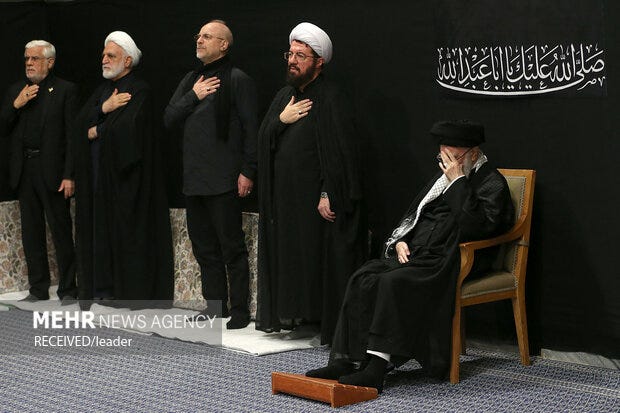Tears for Husayn, Smiles for the Sayyed: Tehran’s Ashura Marks a Defining Moment in the Axis of Resistance
The Leader’s presence was more than a public appearance—it was a powerful message to those who believed that attacks, assassinations, and pressure could break this nation.
Iran, PUREWILAYAH.COM - In an era where narratives are either shaped by the machinery of falsehood or lost in the noise of digital propaganda, truth sometimes reveals itself not through headlines or breaking news—but in a single glance, in a calm presence, in a quiet sentence.
On the night of Ashura, in central Tehran, not on a battlefield or in a government hall, but inside the Imam Khomeini Hussainiyah—the serene smile of the Leader of the Islamic Revolution echoed louder than the world’s noise.
His presence was not a political appearance—it was a statement.
A Response to War, Sanctions, and Psychological Pressure
Ayatollah Sayyed Ali Khamenei’s appearance was a message to those who believed that targeting Tehran’s heart, assassinating scientists and commanders, enforcing sanctions, and launching waves of psychological and media warfare could weaken the spirit of the Iranian nation.
To those who forgot that this soil is Karbala’s soil—not a neutral playing field for political deals—his presence was a living reminder.
Once again, Ayatollah Khamenei proved to the world:
“We do not stand behind borders—we stand behind faith.”
And as long as the path of Ahlulbayt lives, this nation will never die.
Faith Beyond Politics: The Real Victory of Ashura Night
History may need calendars and official documents to record events.
But to understand what happened on this year’s Ashura night, no proof is required—only a beating heart.
For those who were present, it was clear: this was the night faith triumphed over raw power.
Politics dissolved into eulogy.
Leadership was not shouted from a podium—it was embodied in quiet, resolute presence.
After twelve days of war, Tehran breathed again.
Faces softened. Tears flowed—not out of grief, but out of overwhelming joy.
The pillar of the tent was still standing.
From Karbala to Tehran: When the Shrines Came to the People
Haj Mahmoud, the renowned eulogist of the Ahlulbayt, who in previous years would spend Ashura in Najaf or Karbala, remained in Tehran this year.
And yet, it felt as though Najaf and Karbala had come to him.
The Imam Khomeini Hussainiyah smelled of the shrine’s courtyard.
In a moment of intimacy, the Leader told him, with a fatherly smile: “If you’re not tired, recite ‘Ey Iran.’”
That one moment condensed years of sorrow, elegy, and exile into a single spark: the crystallization of a nation’s will.
As Haj Mahmoud began to sing, it was as though the bloodied hand of Abbas lifted Iran’s flag high and declared:
“This land is a continuation of that blood.”
This Was No Less Than Bayn al-Haramayn
If ziyarat means walking upon the sacred ground they walked,
then this night was a visitation of the one who has kept their path alive.
Last night’s gathering was not less than Bayn al-Haramayn—it built a spiritual bridge in the hearts of the people, connecting Ashura to the Day of Reappearance.
And if Ashura is to be reenacted, this time it will not be with just 72 companions, but with a nation as vast as Iran.
The Tears of a Nation—And the Meaning of Leadership
The tears that fell on Ashura night were of a different kind.
Not only for the tragedy of Aba Abdillah al-Husayn, but for the fact that our Wali al-Faqih still stands—that the light still shines, that someone still returns to the frontlines with no hesitation, just as he once stood on the literal frontlines during the early years of war.
It was a night of tears and smiles.
Tears for Husayn… and smiles from witnessing a Husayni presence in Sayyed Khamenei.
When One Presence Defeats a Thousand Narratives
In a world dominated by media powers that craft the dominant narratives, sometimes one silent presence is enough to change the story.
This year, Ashura night in Tehran rose from the heart of the soft war—
and with the calm, steadfast appearance of the Leader,
it became the beating heart of the global resistance.
The eulogy wasn’t just a recitation—it was a call to the nation.
The tears weren’t just mourning—they were awakenings.
This moment may not be officially documented in history books.
But it will be remembered by those who write history with their presence—
those who, last night in that Hussainiyah, gave their hearts… and stood firm.
Source: Mehr News


